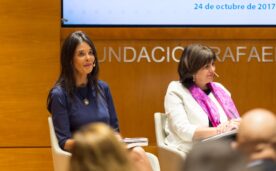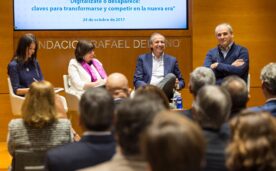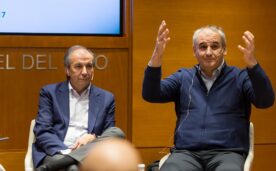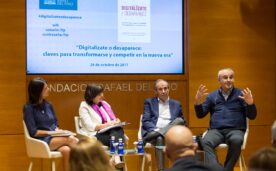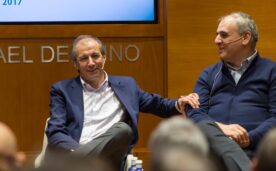Keys to transforming and competing in the new era
Summary:
On 24 October 2017, a dialogue on digitalisation took place at the Rafael del Pino Foundation between Rosa García, President and CEO of Siemens Spain; Carlos Barrabés, President of the Barrabés Group, and Adolfo Ramírez, Deputy General Manager and Head of Technology and Operations at Banco Santander, on the occasion of the publication of the book written by the latter "Digitalise or disappear: keys to transform yourself and compete in the new era". The first to speak was Carlos Barrabés, who pointed out that it is as true to go digital or disappear as it is to go digital and disappear. At the moment, everything is converted into software, uploaded to the cloud and goes global, and what we are seeing is how many processes are being uploaded to the cloud. However, the most important thing is not the software, but the people. Putting technology first is a mistake. You have to put humans first, put their problems first, which means looking for solutions that, in a complex world, can only be found with technology. The big change of the moment is that what we need to do is new things, new ways of doing things. This requires a new way of thinking and being, thinking about what can be built with others. Technology cannot be at the forefront because it commoditises people. In turn, for Rosa García, in this 21st century, companies have no choice but to digitalise. What has changed are the expectations of customers, who have raised the bar in terms of what they expect. Today they demand more personalised products and services, which requires companies to be extremely flexible. Customers are also increasingly demanding more immediacy, more quality, that companies are able to be state-of-the-art, and that products are simple and connected. This requires a clear analysis of the company's capabilities, its strengths and threats, its potential and actual competitors, how to co-create with customers, how to attract the best talent. You also need to have a technology plan and know what is coming. If you digitise badly, you will also die. So in the 21st century, a lot of what is needed is collaboration. Finally, Adolfo Ramírez commented that we are living in a time of radical change that is going to accelerate and, therefore, it is very important to understand it, to understand the context and the new reality. That is when we can understand what is happening to us. Today, customers have superpowers because they have a lot of information. That puts pressure on companies when negotiating with customers, especially when it comes to training their staff. Customers also have another very important superpower, which is that they share and, thanks to technology, they reach a lot more people with what they share. This is changing marketing as well as the strategies of many companies. Customers can also make decisions in real time. When organisations understand what is happening, their business model changes. The first thing to do is to reflect. In this sense, you have to consider one simple thing in your strategy: what you want to be. The first thing is where you want to get to. The transformation plan has to be dynamic. You have to change the whole organisation, starting with the culture and continuing with the value offer to the customer. Then come the people, who have to know how to talk to the customer. Then comes technology. The last dimension is innovation. It has to be dual because you have to be very good today, but you also have to investigate new business models. It also has to be collaborative, to be able to grow. And, most importantly, you have to move from power-point to action.
The Rafael del Pino Foundation is not responsible for the comments, opinions or statements made by the people who participate in its activities and which are expressed as a result of their inalienable right to freedom of expression and under their sole responsibility. The contents included in the summary of this conference are the result of the debates held at the meeting held for this purpose at the Foundation and are the responsibility of their authors.
The Rafael del Pino Foundation is not responsible for any comments, opinions or statements made by third parties. In this respect, the FRP is not obliged to monitor the views expressed by such third parties who participate in its activities and which are expressed as a result of their inalienable right to freedom of expression and under their own responsibility. The contents included in the summary of this conference are the result of the discussions that took place during the conference organised for this purpose at the Foundation and are the sole responsibility of its authors.
